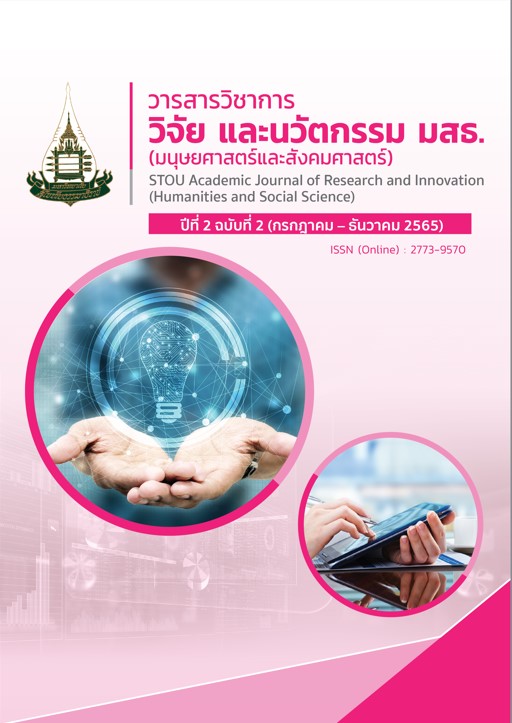Effectiveness of Positive Psychology and Health Literacy Development Programs affecting Self-care Behaviors in Chronic Disease Risk Groups
Keywords:
Positive psychology, Health literacy, Risk groups for chronic diseasesAbstract
This research aimed to study effectiveness of positive psychology intervention towards self-care behavior of risk groups for chronic diseases. Simple random sampling technique was used to select the sample. The study was conducted in Bang Rachan district, Singburi province. The sample was divided into the experimental group and control group. The sample comprised risk groups screened by public health workers. Risk group for diabetes had capillary fasting blood glucose level of 100-125 mg% and risk group for hypertension had blood pressure level of 120-139 / 80-89 mmHg, BMI was greater than or equal to 23. The sample of 100 persons divided into 50 persons in the experimental group and 50 persons in the control group. The experimental group participated in positive psychology intervention that consists of the development of positive psychology and development of health literacy. The control group participated in the development of health literacy to prevent diabetes and hypertension. Statistics used in data analysis were percentage, mean, standard deviation. A repeated measures ANOVA was used for hypothesis testing.
The study results found interaction between the experimental group and a period of time with statistical significance (p<0.01). It was found that after the experiment and follow-up, the experimental group had higher self-care behavior scores than the control group with the statistical significance level of 0.05. This showed that the program was effective in changing health behaviors and after 4 months of participating in the program. It was found that the sample group still had health care behaviors. Suggestion: The positive psychology intervention should be used with samples having similar characteristics. The knowledge obtained should be developed further to be a self-care handbook for risk groups for non-communicable diseases.
References
กรมควบคุมโรค กองโรคไม่ติดต่อ. (2563). รายงานสถานการณ์โรค NCDs เบาหวาน ความดันโลหิตสูงและปัจจัยเสี่ยงที่เกี่ยวข้อง. กรุงเทพฯ: อักษรกราฟฟิคแอนด์ดีไซน์.
สุดารัตน์ ตันติวิวัทน์. (2560). จิตวิทยาเชิงบวก: การพัฒนา ประยุกต์ ความท้าทาย. วารสารพฤติกรรมศาสตร์เพื่อการพัฒนา, 9(1), 277-290.
ประไพพิศ สิงหเสม, พอเพ็ญ ไกรนรา และวรารัตน์ ทิพย์รตัน์. (2562). ความสัมพันธ์ระหว่างความรอบรู้ด้านสุขภาพกับพฤติกรรมสุขภาพตาม 3อ.2ส. ของผู้สูงอายุ ตำบลหนองตรุด จังหวัดตรัง. วารสารวิทยาลัยพยาบาลบรมราชชนนีอุตรดิตถ์, 11(1), 37-51.
วิชัย เอกพลากร, หทัยชนก พรรคเจริญ และวราภรณ์ เสถียรนพเก้า. (2562). การสำรวจสุขภาพประชาชนไทยโดยการตรวจร่างกาย ครั้งที่ 6 พ.ศ. 2562-2563. กรุงเทพฯ: อักษรกราฟฟิคแอนด์ดีไซน์.
Bas Geboers, Sijmen A. Reijneveld, Carel J.M. Jansen & Andrea F. de Winter. (2016). Health Literacy Is Associated With Health Behaviors and Social Factors Among Older Adults: Results from the LifeLines Cohort Study. Journal of Health Communication, 21(sup2), 45-53, DOI: 10.1080/10810730.2016.1201174.
Boehm, J. K., Peterson, C., Kivimaki, M., & Kubzansky, L. (2011). A Prospective Study of Positive Psychological Well-Being and Coronary Heart Disease. Health Psychology, 30(3), 259–267.
Nutbeam D. (2008). The evolving concept of health literacy. Social Science and Medicine, 6(7), 2072-78.
World health organization. (2017). Health literacy. The solid facts. European journal of Public, 24(1), 1880-87.
Downloads
Published
How to Cite
Issue
Section
License
Copyright (c) 2022 STOU Academic Journal of Research and Innovation (Humanities and Social Science) (Online)

This work is licensed under a Creative Commons Attribution-NonCommercial-NoDerivatives 4.0 International License.





